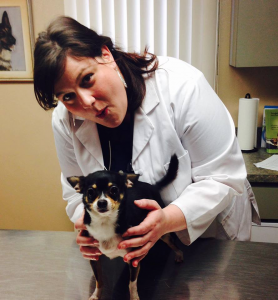
There is a hypothesis, made popular in the book “Born to Run,” that humans evolved to run long distances. You see, around 2 million years ago our ancestors brains grew to unprecedented sizes. Brains use a lot of energy—the kind of energy that comes from eating meat. There is little evidence to support hominid’s ability to hunt at that point in history. We had no claws, nor were we particularly powerful. Sophisticated hunting tools have only been discovered as far back as a few hundred thousand years. So where did we get all that brain growing meat from?

The answer, according to some, is persistence hunting. Persistence hunting is the idea that early man hunted by chasing prey to the point of heat exhaustion. We were slow and weak, but we had the stamina and fortitude to literally run an animal to death. Endurance was our evolutionary superpower.
Burnout is a big problem in veterinary medicine but if early man’s endurance could help him not only survive, but thrive in the savannah, then we can surely survive and thrive in our modern day careers. We were born to endure, all we need to do is take a little advice from our own bodies.
Slow Down
Speed and endurance are a trade-off. You can only go full sprint ahead for so long before you collapse. The persistence hunter’s prey will run off faster than they will, but as soon as they get ahead, they have to stop and rest, giving the hunter a chance to catch up again. It’s the tortoise and the hare. Slow and steady really does win.
At work it can feel like all that work is chasing you down like you’re the prey, but you’re not. You’re the predator, taking tasks down one by one. But to do that right, you need to take your time. When you rush, you wind up feeling discombobulated, you miss things, you make mistakes and you get burned out. Slow down. You’ll get caught up eventually and you’ll feel better about the work that you did when you do.
Be Efficient
Efficiency is key. Humans have evolved several adaptations that help us run more efficiently—ligaments that help stabilize our neck and shoulders, longer legs, shorter toes, rubbery tendons that store energy, and large adrenal and thyroid glands that help us metabolize and utilize energy stores better.
Efficiency at work is vital. That means scheduling properly, having enough support staff, and also, not wasting time. Write your medical records up for each patient before moving on to the next (guilty as charged here). If you have a spare minute, refill that script that’s been sitting in the pharmacy instead of waiting impatiently for the front desk to finish checking in the next client. Delegate tasks to the right support staff instead of trying to do everything yourself, but offer help to each other when needed.
Stay Cool
One of the biggest advantages humans have to help us go the distance is our ability to cool off. We’ve all probably had the misfortune of seeing what happens to an animal who over heats—pulmonary edema, seizures and DIC for starters. Most mammals cool by panting, but it’s not very efficient, and you can’t pant and run at the same time. But humans sweat! This allows us to dissipate heat off of a much larger surface area and helps keep us cool.
We need to adapt and find ways to keep cool at work too. Sometimes it’s just stepping away from a situation for a couple of minutes. Sometimes it’s making sure you get a proper lunch break. And sometimes it’s bigger.
In those circumstances when it seems like life and work is getting to hot too handle, it’s important to make sure you have people to confide in that can understand what you’re going through. Having a good relationship with the people you work with so that you can celebrate wins and commiserate losses together is important. If you work in a toxic environment where that’s not possible, it might be time to move on to a new practice. In the meantime, look for other colleagues you can vent to. Join your local VMA, or look online. There are some great Facebook support groups like Not One More Vet or Veterinary Support Staff Unleashed.
Get Some Air
Anaerobic respiration will only take you so far. We need to breathe in oxygen if we want to last and humans are excellent breathers. As bipeds we are able to standup tall, puff out our chests and suck in large amounts of air.
We all need to take time to catch our breath if we want to keep moving forward. Working all the time is a sure fire way to feel suffocated. The oxygen that sustains us is our friends, family and hobbies. Just as it’s important to have colleagues who understand what you’re going through, it’s important to have a support system that’s unrelated to work. Surround yourself with people who will take to you about sports, travel destinations, or politics (okay, maybe not politics). Go for a run, take up knitting, read a book (but not a medical one). Just make sure you take a little time to get fresh air.
The truth is, we’re losing too many good veterinarians and technicians to burnout and compassion fatigue. And many people in the field are only still here because they feel trapped by large student loans or other circumstances. That is not okay. Veterinary medicine is a fulfilling and important vocation, not a prison sentence. It’s not always going to be easy and sometimes we’re going to struggle, but we were built to endure. So slow down, be efficient, stay cool, get some air, and enjoy the run.
The views and opinions expressed in this article are those of the author and do not necessarily reflect the position of the DrAndyRoark.com editorial team.
 About the Author
About the Author
Dr. Lauren Smith graduated in 2008 from Ross University School of Veterinary Medicine and completed her clinical year at Cornell University. Her professional interests include internal medicine, preventative medicine and client education. Dr. Smith lives and practices on Long Island with her cat, Charlie and dog, Frankie and loves to read write and run in her free time. You can check out more of her writing at laurensmithdvm.com